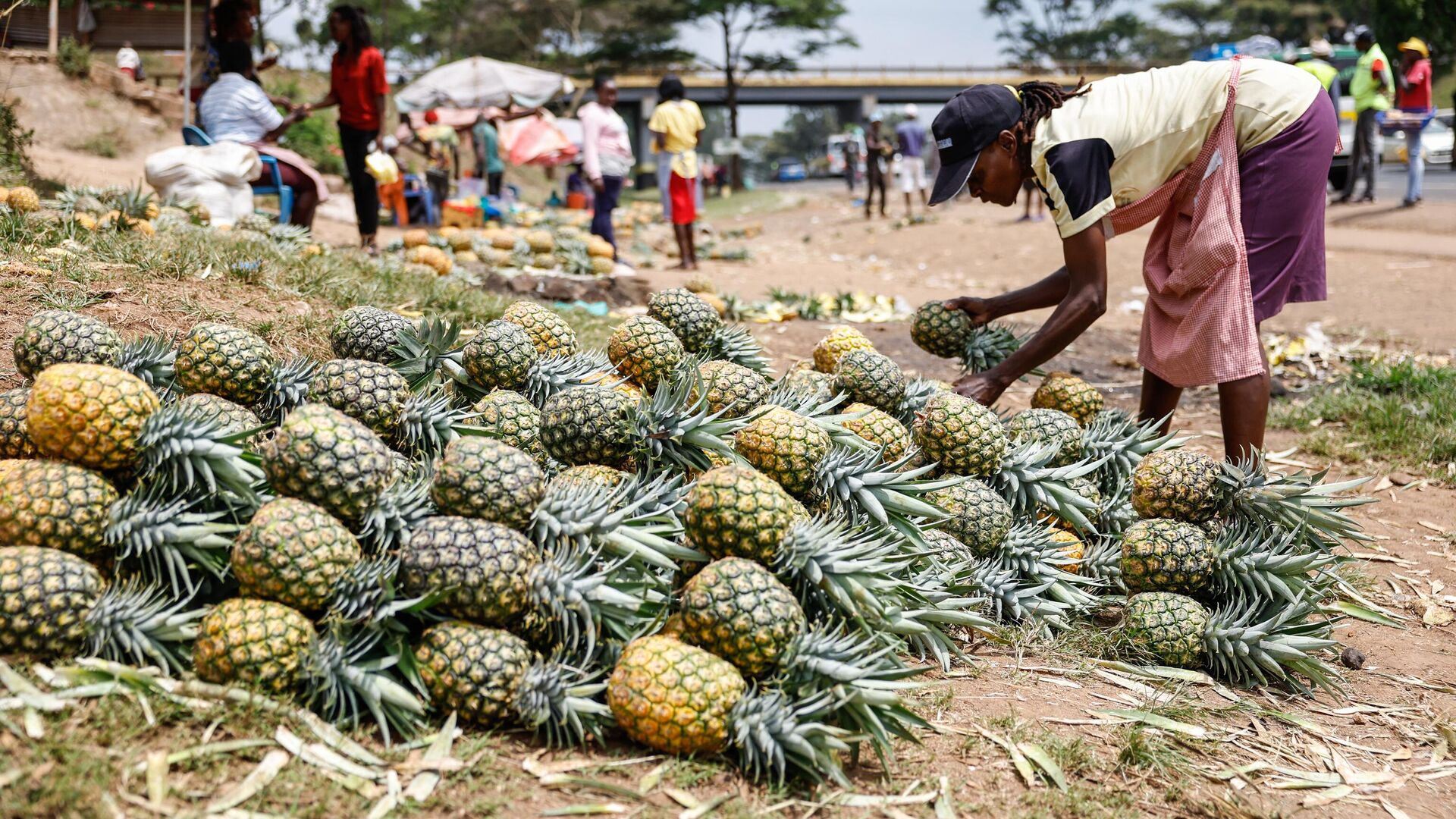https://en.sputniknews.africa/20240315/landmark-decision-kenyan-activists-on-first-win-in-human-right-violation-case-against-del-monte-1065560357.html
'Landmark Decision': Kenyan Activists on First Win in Human Right Violation Case Against Del Monte
'Landmark Decision': Kenyan Activists on First Win in Human Right Violation Case Against Del Monte
Sputnik Africa
Security guards at Del Monte pineapple farm near the Kenyan capital of Nairobi have been accused of brutally attacking and killing people suspected of... 15.03.2024, Sputnik Africa
2024-03-15T16:59+0100
2024-03-15T16:59+0100
2024-03-15T17:37+0100
opinion
africa in details
kenya
nairobi
united states (us)
neocolonialism
court
justice
human rights
murder
https://cdn1.img.sputniknews.africa/img/07e8/03/0f/1065570104_0:160:3072:1888_1920x0_80_0_0_a66c357e205517a0e5abe14033b83fc3.jpg
Prosecution of the Del Monte company for human rights violations within the Kenyan legal system is a "landmark decision," James Mwangi Macharia, Founder and Executive chairman of the African Center for Corrective and Preventive Action that sues Del Monte, told Sputnik Africa.The speaker continued by explaining how the litigation process unfolded. One of the first challenges was to actually sue the company, as it was claiming that the US firm cannot be legally prosecuted in Kenya.The NGO, however, successfully filed a lawsuit and the legal process began. According to the guest, the activists wanted to prove that no one is above the law in their country.Speaking about protection of African workers from violations some by international corporations in general, Macharia urged his fellow Africans to stand up against such an exploitation, calling it a "patriotic duty."Answering Sputnik Africa's question on why people were not so eager to step up, Macharia explained that big international companies are well-protected and that's why people are scared to fight against them, adding that one of the goals of the current legal battle against Del Monte Kenya is to establish "a sustainable relationship between companies, community, and the government."It's worth noting that the company recently issued a statement, saying that it is "constantly looking for areas where we can improve and emphasize its commitment to human rights." Macharia commented on this, saying that this "is just a PR exercise" and linked the company's claims of non-liability in Kenya with possible racial issues.Macharia also pointed out that these violations are not a subject of mass publication in Western press, since the companies can lose their investors if such information is widely spread.The activist finished his speech with an inspiring message, reminding that Africa shouldn't allow "neocolonial neoliberal policies" to undermine dignity and rights of African people.Kelvin Mugambi Kubai, a lawyer with the African Center for Corrective and Preventive Action and the second guest of Sputnik Africa, called "a win" the fact that the victims of Del Monte were being able to come to court and prosecute the company in Kenya and not somewhere else.The activist argued that the community needed "healing" after all the crimes committed by Del Monte, adding that the regular people should be treated equally and not exploited.He further explained that social healing would involve social justice, reparations to the victims and collaboration between the community and the company.Furthermore, Kubai called Del Monte's claim of not being able to be sued in Africa "ridiculous" and "reckless" as it shows the company "doesn't care" about the community.Wrapping up the interview, Kubai called upon the Kenyan workers to stand up for their sovereign rights.
https://en.sputniknews.africa/20231227/us-company-del-monte-trades-labor-brands-of-kenyans-chair-of-ngo-representing-families-of-victims-1064335622.html
kenya
nairobi
united states (us)
east africa
Sputnik Africa
feedback@sputniknews.com
+74956456601
MIA „Rossiya Segodnya“
2024
Christina Glazkova
https://cdn1.img.sputniknews.africa/img/07e7/0b/07/1063380906_0:0:673:674_100x100_80_0_0_79628b4d0cd9f29291a57aa13bbf9e7a.jpg
Christina Glazkova
https://cdn1.img.sputniknews.africa/img/07e7/0b/07/1063380906_0:0:673:674_100x100_80_0_0_79628b4d0cd9f29291a57aa13bbf9e7a.jpg
News
en_EN
Sputnik Africa
feedback@sputniknews.com
+74956456601
MIA „Rossiya Segodnya“
Sputnik Africa
feedback@sputniknews.com
+74956456601
MIA „Rossiya Segodnya“
Christina Glazkova
https://cdn1.img.sputniknews.africa/img/07e7/0b/07/1063380906_0:0:673:674_100x100_80_0_0_79628b4d0cd9f29291a57aa13bbf9e7a.jpg
africa in details, kenya, nairobi, united states (us), neocolonialism, court, justice, human rights, murder, sputnik africa, east africa
africa in details, kenya, nairobi, united states (us), neocolonialism, court, justice, human rights, murder, sputnik africa, east africa
'Landmark Decision': Kenyan Activists on First Win in Human Right Violation Case Against Del Monte
16:59 15.03.2024 (Updated: 17:37 15.03.2024) Christina Glazkova
Writer / Editor
Security guards at Del Monte pineapple farm near the Kenyan capital of Nairobi have been accused of brutally attacking and killing people suspected of trespassing the farm's land in recent years. The company said it could not be sued in Kenya, but a local court recently rejected that claim. Sputnik Africa discussed the trial with the activists.
Prosecution of the Del Monte company for
human rights violations within the Kenyan legal system is a "landmark decision,"
James Mwangi Macharia, Founder and Executive chairman of the African Center for Corrective and Preventive Action that sues Del Monte, told
Sputnik Africa.
"We had a very landmark decision against Del Monte. [...] For us, it's a victory today, a huge one, against the company, because, we know that it's path towards us getting justice because it has not been easy to challenge this company, one because of its [...] resources, and the issue that they are not Kenyan. [...] We cannot allow a company based in the United States to give a flimsy reason that they cannot be sued, but they can commit crimes against our people," the chairman said.
The speaker continued by explaining how the
litigation process unfolded. One of the first challenges was to actually sue the company, as it was claiming that the
US firm cannot be legally prosecuted in Kenya.
"There's no way a company can own close to 30,000 acres of land in Kenya, they farm pineapples, they sell those pineapples around the world, but they claim that they cannot be sued in Kenya because they are registered in Cayman. That is not acceptable," Macharia said.
The
NGO, however, successfully
filed a lawsuit and the legal process began. According to the guest, the activists wanted to prove that no one is above the law in their country.
"Our constitution says nobody is above the law, everybody is equal before the law, so we challenged Del Monte. We sue Del Monte and that is something that we said we are going to challenge and, so far, [there is] a lot of progress," he added.
Speaking about protection of African workers from violations some by international corporations in general, Macharia urged his fellow Africans to stand up against such an exploitation, calling it a "patriotic duty."
"It's important for Africa to understand that the time has come when African people, African organizations, and non-state actors defend our people against exploitation by these giant multinationals that are operating in Africa but not registered here because they do not want to be responsible, they don't want liability. They want to exploit our people [...]. For us, it's a noble duty. It's a patriotic duty. It is a spirit of Pan-Africanism that you are trying to also upgrade in terms of judicial action against [corporations]," the interviewee argued.
Answering Sputnik Africa's question on why people were not so eager to step up, Macharia explained that big international companies are well-protected and that's why people are scared to fight against them, adding that one of the goals of the current legal battle against Del Monte Kenya is to establish "a sustainable relationship between companies, community, and the government."
"We believe that our courts are functioning, and we will get justice because what we want is a sustainable relationship between companies, community and the government. That is all that we are asking," the activist said.
It's worth noting that the company recently issued a statement, saying that it is "constantly looking for areas where we can improve and emphasize its commitment to human rights." Macharia commented on this, saying that this "is just a PR exercise" and linked the company's claims of non-liability in
Kenya with possible racial issues.
"That is just a PR exercise, [it] is a cosmetic statement just for the media [...]. Who says in the current world, 'we can't be sued'? Especially, 'we can't be sued in your country'! Is it because we are an African country? Is it a racial issue? Or is it that we are called “the Third World country”? [...] No, we are part of the global community [...] and we must defend our dignity as African people," the speaker said.
Macharia also pointed out that these violations are not a subject of mass publication in Western press, since the companies can lose their investors if such information is widely spread.
The activist finished his speech with an inspiring message, reminding that Africa shouldn't allow "
neocolonial neoliberal policies" to undermine dignity and rights of African people.
"Africa is part of the global community, and we want [Africa to be] respected, just like the way we respect [...] other parts of the world. We want these multinationals to understand that Africa has potential, Africa is the next frontier, and we cannot extend neocolonial neoliberal policies that undermine our people, their dignity, their rights and even manipulate African governments again. We want a sustainable relationship between Africa and the rest of the world [...] We as African people want justice. Respect our people, respect our laws, respect our country and respect our dignity," Macharia concluded.
Kelvin Mugambi Kubai, a lawyer with the African Center for Corrective and Preventive Action and the second guest of
Sputnik Africa, called "a win" the fact that the victims of Del Monte were being able to come to
court and prosecute the company in Kenya and not somewhere else.
"For 60 years now, since independence, these people have not had a chance to prosecute this matter before a court of competent jurisdiction. So it is a win in itself. [...] We hope that we shall get justice for our people in the end," Kubai said.
The activist argued that the community needed "healing" after all the
crimes committed by Del Monte, adding that the regular people should be treated equally and not exploited.
"But they [Del Monte] fail to realize that these issues are way deeper, these issues require social healing. [...] In a real sense, the community is not the enemy here. Actually, the actual enemy is Del Monte that takes away their land, that will underpay them, that will blow their profits back to the American investors to the detriment of the people," he said.
He further explained that social healing would involve social justice,
reparations to the victims and collaboration between the community and the company.
Furthermore, Kubai called Del Monte's claim of not being able to be sued in Africa "ridiculous" and "reckless" as it shows the company "doesn't care" about the community.
"It's something [i.e. human rights violations] that is well within their knowledge, but they've swept under the carpet to avoid liability, to avoid responsibility to the victims, and to keep a clean face while keeping very bloody hands on the other side," the activist added.
Wrapping up the interview, Kubai called upon the Kenyan workers to stand up for their sovereign rights.
"I would say the Kenyan workers have sovereign rights. They are these constitutions that protect them. And they should, of course, stand up for their rights and in protection of their sovereign," he said.



